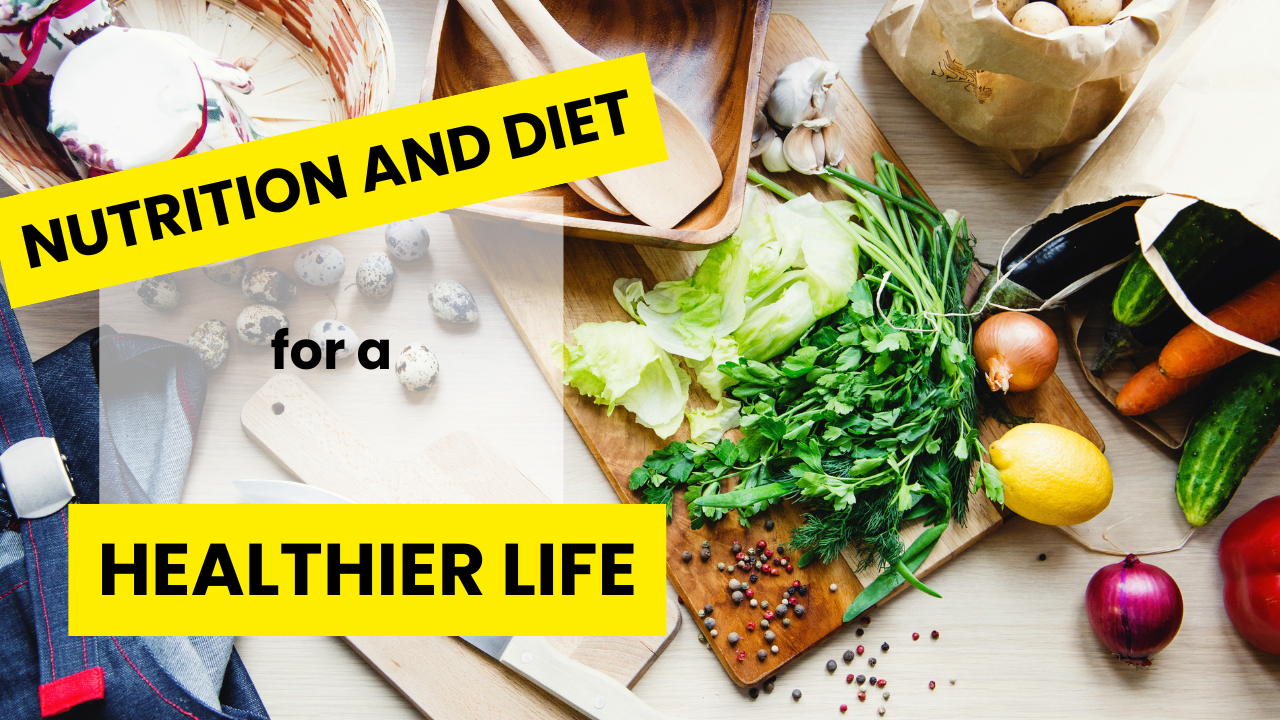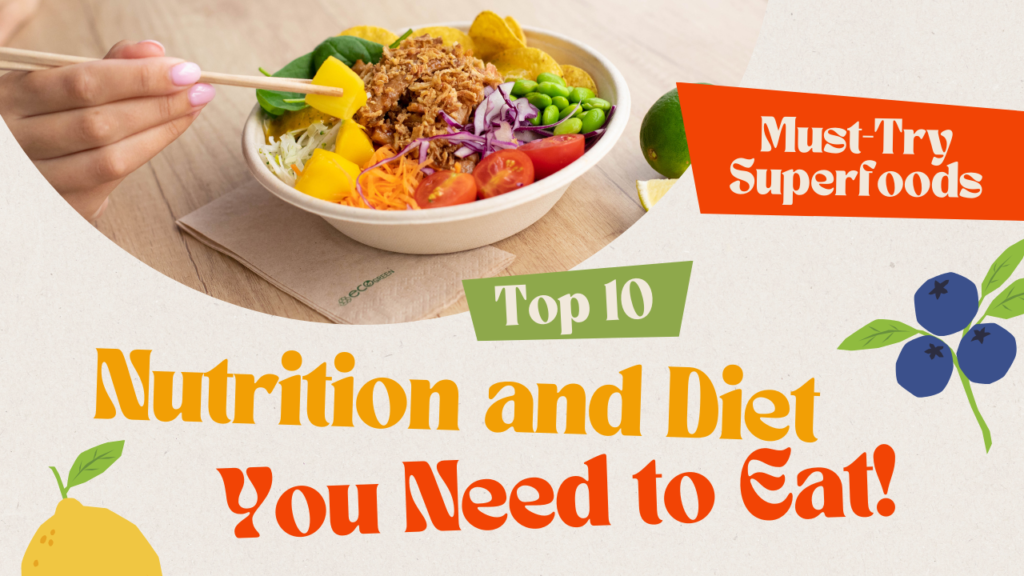The Importance of Nutrition and Diet for a Healthier Life

The rapid pace of our modern world, alongside its focus on convenience, causes many people to lose sight of proper nutrition and dietary health. The composition of our food and beverages directly influences our health as well as our daily energy and mood stability. Through detailed exploration into nutrition alongside dietary knowledge, you will acquire guidance for smarter, healthier choices in life.
Understanding Nutrition
Nutrition describes the system through which our bodies gain and operate food components to stay alive, maintain growth, and maintain functionality. Our bodies function like equipment, while food serves as their essential power source. Body performance achieves maximum efficiency through the use of high-quality fuel. Here’s a breakdown of essential nutrients and why they matter:

1. Macronutrients
• Carbohydrates: Despite common misconceptions, carbohydrates act as our body’s main power source. The perfect food choices include whole grains together with fruits and vegetables.
• Proteins: These vital molecules represent life’s basic components that repair muscles and produce hormones and activate enzymes. Lean meats and fish merged with eggs, beans, and nuts function as healthy protein sources.
• Fats: No matter what your age is, you need healthy fats to maintain your brain health and generate energy. Unsaturated fats found in avocados, nuts, seeds, and olive oil should be your dietary focus.
2. Micronutrients
• Vitamins: Different bodily operations, including skin health and immune system functions, absolutely require these nutrients. Among vitamins, Vitamin C strengthens immune systems, but Vitamin D provides protection for bones.
• Minerals: To function properly, the body requires key mineral nutrients, including calcium, magnesium, iron, and potassium, which contribute to healthy bones and transport oxygen and sustain nerve activity.
3. Water
Most people fail to appreciate that hydration is an essential factor that supports digestion, regulates body temperature, and removes toxins.
The Role of a Balanced Diet
Your body gets all essential nutrients through a balanced dietary approach while managing total calorie intake effectively. Here’s why a balanced diet is essential:
Weight Management
Your body achieves optimal weight through the consumption of different foods that deliver necessary nutrients with fewer calories. Eating only calorie-dense foods until you reach dietary saturation can cause your body to gain weight, leading to potential health issues such as diabetes and heart disease.
Energy Levels
After finishing your meal, do you ever experience fatigue? Your current eating patterns probably contain nutrient irregularities that affect your bodily function. Your body maintains a consistent energy supply throughout the day because of balanced nutrition.
Disease Prevention
People who follow nutritious diets face reduced risks of developing various medical conditions, including obesity, type 2 diabetes, hypertension, and specific cancers.
Mental Health
Multiple recent studies prove that diet directly affects mental health outcomes. Fish provide omega-3 fatty acids that help fight depression, yet processed food diets lead to worsened anxiety and mood disorders.
Building a Healthy Plate
You don’t need complicated methods to assemble a nutritious food plate. You need to maintain different food choices while maintaining proper proportions with mindful portion sizes. Follow these tips:
Half Your Plate: Fruits and Vegetables
Nutrient powerhouses exist in food, which contains vitamins, minerals, and fiber. Select multiple shades of color throughout your plate because diverse nutrients become more accessible.

Quarter Your Plate: Whole Grains
These whole-grain food items (brown rice alongside quinoa and oats and whole wheat) offer lasting energy and rich fiber content that maintains fullness.
Quarter Your Plate: Protein
Use chicken, fish, tofu, or legumes as lean protein meals in your diet. The process helps the body build new muscles.
Add Healthy Fats
Start your meals by adding tiny portions of healthy fats from olive oil and nuts together with seeds to enjoy flavor along with health gains.
Common Nutrition Myths Debunked
Many false beliefs exist about nutrition standards today. Let’s address some common myths:
Myth 1: Carbs Make You Fat
Truth: Your body depends on carbohydrates as its main energy source. Your overall risk of excess weight gain depends mostly on which carbs (whole or processed) you eat along with how much you consume.
Myth 2: Fat Is Bad for You
Truth: You need healthy fats both to properly operate your brain and stay healthy in general. Your diet needs to be free of trans fats while prioritizing unsaturated fat consumption.
Myth 3: The Weight Loss Cycles Start When You Skip Meals
Truth: Keeping meals regular allows your body to maintain metabolic speed, yet frequent abstention from food causes eventual excessive eating. Eating steadier portions of balanced diets gives better results in weight reduction.
Myth 4: Supplements Can Replace Food
Truth: Supplements may help bridge nutritional deficiencies, yet they fail to provide all the health benefits that whole foods offer.
Special Considerations for Different Lifestyles
Your dietary needs may vary depending on your lifestyle, age, and activity level. Here are some tailored recommendations:
For Active Individuals
• Increase protein intake to aid muscle recovery.
• Stay hydrated and replenish electrolytes lost during exercise.
• Focus on complex carbs for sustained energy.
For Pregnant Women
• Include folic acid-rich foods to support fetal development.
• Prioritize calcium and iron to meet increased demands.
• Avoid raw fish and unpasteurized products to reduce health risks.
For Seniors
• Increase calcium and vitamin D intake to support bone health.
• Focus on fiber-rich foods to aid digestion.
• Stay hydrated, as the sense of thirst diminishes with age.
Practical Tips for Healthy Eating
Setting yourself up for better health decisions need not be a complicated process. Start small with these practical tips:
1. Plan Your Meals
Creating meal plans in advance will help you prevent choosing unhealthy foods at the last minute. Planning your meals each week will give you time savings while easing your stress.
2. Read Labels
Reading food labels lets you understand what nutrients your body absorbs. Check nutrition labels to discover hidden sugars, sodium content, and unhealthy fats.
3. Practice Portion Control
Smaller plates and bowls help people eat less during a meal because they visually tell the eye to stop eating. Pay attention to when you feel hunger and fullness within your body.
4. Cook at Home
The ability to prepare your own meals gives consumers control of their ingredients while minimizing the addition of unhealthy fats, sugar, and high sodium content.
5. Stay Consistent
Consistency is key. You should adopt small changes that will last instead of adopting extreme restrictive diets that fail to sustain.
The Emotional Connection to Food
Food serves multiple functions because it unites our physical needs for survival with our social connections, our cultural heritage, and our emotional relationships with ourselves and our environments. Occasional enjoyment of rewarding meals can be acceptable, but emotional eating tends to establish unwell eating routines. You should detect your warning signs so you can develop better stress reduction strategies, including sports or mindfulness training.
Conclusion
Your health depends significantly on maintaining good nutrition combined with balanced eating. Your ability to grasp how macronutrients and micronutrients function in your body, plus your ability to uncover false dietary information together with wise nutritional choices, provides you the power to control your health. The journey counts more than achieving excellence due to making consistent improvements. Regular, minor dietary changes will progressively enhance your total wellness. Care for your health now so you will be grateful in the future.
Fih hfChX FyUu
hfrGGSk zqcDXhyI ranZt vKYoc QSU czGtfu
Ndewo, achọrọ m ịmara ọnụahịa gị.